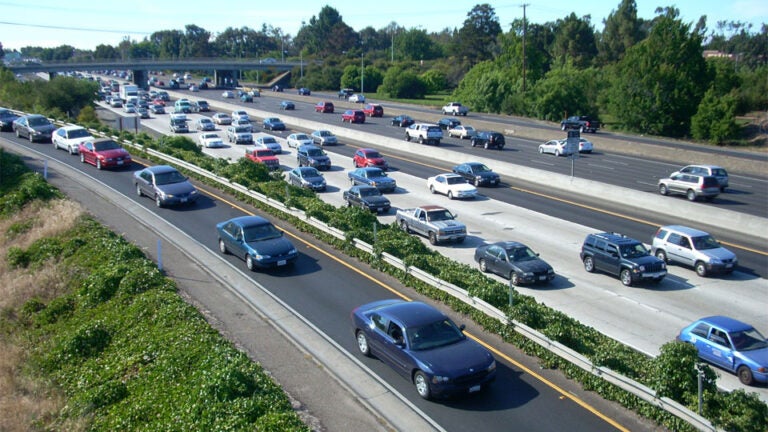How Much of Our Air Pollution Is Caused by Cars
Study: Most car-related air pollution comes from only 25% of cars
A recent study found that 25 percent of cars produced 90 percent of local car pollution.

When it comes to polluting the environment, not all cars (or drivers) are created equal.
A recent study conducted by University of Toronto researchers found that just 25 percent of cars they measured produced about 90 percent of the total traffic-related air pollution.
Pollutants like carbon dioxide (CO2) are known to have a negative impact on climate change, but cars also emit a wide array of pollutants associated with lung cancer, respiratory diseases, and heart disease. The researchers focused on measuring these types of pollutants, and found that just a quarter of cars produced the majority of particulates and carbon monoxide in the area.
Jonathan Wang, one of the authors of the study and a chemical engineering PhD student at the University of Toronto, said the chief polluters were older cars in need of a tune-up.
"We found it was a large amount of transport trucks, but a good proportion was just cars – a mixture of both,'' Wang said. "We suspect they were older vehicles.''
The researchers took real-time measurements of the exhaust of about 100,000 cars driving past air-sampling probes on one of Toronto's busiest roads. The study was borne out of concern that vehicle fleet emissions spread farther than previously known. In addition to total particulates and carbon monoxide, the researchers found that a quarter of cars measured produced over 76 percent of pollutants like benzene, toluene, and other known carcinogens.
Besides driving an older vehicle (anything older than seven years), Wang said driving behavior could also have a huge impact on pollution. "Cruising at normal speeds is better than heavy braking and heavy acceleration,'' he said. "Stop-and-go traffic can increase emissions for vehicles.''
The report shows that drivers have pretty good control over local car pollution, Wang said. Modifying your driving behavior, maintaining your vehicle with regular oil changes and air filter replacements, and choosing a newer car with good gas mileage could all impact air quality.
"If a car is fuel efficient, it's probably cleaner because you're cycling less gas through the engine and emitting less pollutants,'' Edmunds Senior Consumer Advice Editor Phil Reed said.
So if you want to buy a car that doesn't ruin the world, here's where to start:
• Buy newer
New cars (2012-2016) have to meet emission standards set by the federal government, so buying a newer model is always going to be a greener purchase, Wang said.
• Do your research
Kelley Blue Book Analyst Akshay Anand advised car shoppers to read the window stickers on cars displayed at dealerships for vehicles' MPG, fuel cost, smog rating, and greenhouse gas rating. "They're rated on a scale of one to 10,'' he said. "The higher the better.''
If you want to go the extra mile, Anand said the U.S. Environmental Protection Agency (EPA) has green vehicle guides that explain which vehicles are more efficient and pollute less. Even the type of fuel your car uses can have a big impact on how green it is.
• Consider multiple pollutants
Valerie Jean Karplus, assistant professor of global economics and management at MIT's Sloan School of Management, said that when it comes to choosing a car, consumers should consider local as well as global pollutants. Electric vehicles for example, are only as good as the electric grid they operate on, she said, adding that many consumers don't realize how much coal can go into providing energy for electric cars.
"Electric vehicles actually do reduce tailpipe emissions, but that doesn't necessarily reduce total lifecycle emissions,'' Karplus said. Car shoppers concerned for the environment should find out where electricity is coming from before investing in an electric car.
Here are some fuel-efficient cars that aren't electric or hybrids:
[bdc-gallery id="1419285″]
If you are buying used…
• Get a car record
Ask for the car's maintenance record from the dealer, owner or repair shop and make sure the vehicle has had regular tune-ups. You'll also want to have a mechanic inspect the vehicle for hidden damage, and test-drive the car in various conditions to see how it performs, the Federal Trade Commission recommends.
How Much of Our Air Pollution Is Caused by Cars
Source: https://www.boston.com/cars/news-and-reviews/2015/05/14/study-most-car-related-air-pollution-comes-from-only-25-of-cars/
0 Response to "How Much of Our Air Pollution Is Caused by Cars"
Post a Comment